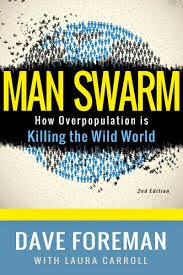GROWTH FOR THE SAKE OF GROWTH IS THE IDEOLOGY OF THE CANCER CELL. EDWARD ABBY
 I remember reading the POPULATION BOMB, by Stanford professor Paul Ehrlich, back in the early 1970s in my high school biology class. The book was his epiphany addressing the human population growth during America's awakening to the environmental movement of the 1960s. A time when Senator Nelson helped bring the first Earth Day to reality on April 22, 1970. This book enlightened our society on the concerns of the impending spiral of the human population growth coupled with the subsequent food crisis. At the time we had just added our 4th billion human on the planet. A time when families seriously considered having only 2 children.
I remember reading the POPULATION BOMB, by Stanford professor Paul Ehrlich, back in the early 1970s in my high school biology class. The book was his epiphany addressing the human population growth during America's awakening to the environmental movement of the 1960s. A time when Senator Nelson helped bring the first Earth Day to reality on April 22, 1970. This book enlightened our society on the concerns of the impending spiral of the human population growth coupled with the subsequent food crisis. At the time we had just added our 4th billion human on the planet. A time when families seriously considered having only 2 children.So what happened? These predictions did not immediately come true. Along came the development of such things as super rice that grew faster and bigger, allowing poorer developing countries to grow at incredible rates. Technology and medical advances followed, diseases like smallpox were virtually eliminated, along with wonder drugs that could wipe out bacteria, these along with many more, led to the increase of people's average life span from 40 years old during Christ's time to its doubling into the 80s in many countries. SO WHAT HAPPENED?.. IT HAS ONLY BEEN DELAYED
By Dan Foreman with Laura Carroll
This dynamic book reawakens us to the impending environmental issues. Written so the common person can understand the concepts with great clarity, with superb comparisons and graphs.
http://www.amazon.com/
1. For every human alive 50,000 years ago there are one million people today
2. Everyday we add a net of @200,000 people to the planet which equals 1 million extra people every 5 days! @83 million in a year: the size of Germany
3. Nigeria had 19 million in 1950, 85 million today, and is projected to have 174 million in 2045
4. Even if we limit the family size to 2 children, it will take 2-3 generations to reach a sustainable
level
5. Most of our growth in the US in the last 50 years has been due to immigration.
 |
| DEFORESTATION IN MADAGASCAR |
 |
| STRANDED INDRI LEMUR FROM FIRE |
IMPENDING ENVIRONMENTAL DISASTERS AND ELIMINATION OF EARTHLINGS LINKED TO POPULATION BOMB 2:
As Paul Ehrlich had his awakening in the streets of India, I had mine in
Madagascar in 2015 while trekking through the rainforest. I had never witnessed rainforest being burned and cut down right before my eyes, and feeling helpless as we heard the cries of the Indri Lemur. All this to plant rice to feed a few families on the hillsides. Suddenly I realized the devastation not only affects our future survival, but other species too, imagine a world without wildlife.
 |
| TRAIL ALONG BURNED HILLSIDE |
 |
| WOMEN PLANTING RICE ON HILLSIDE |
SOLUTIONS: So what do we do...... read the book, read the book, tell a friend to read the book, share it with your book club. There are many solutions suggested in the book, this is not rocket science. We know what it takes to curb the current growth rate, but as Dave Foreman suggest do we have the will? We need to educate the general public, governments, including our own. Send them a copy of the book. It only takes 8 letters to an elected official before they put it on the table to address.
We have technology on our side, be creative, as we know Africa will suffer the most in the next 50 years. There are programs in place, the last 2 chapters of Foreman's book outline some great strategies. All you have to do is figure out what your part is and this will make a difference.

No comments:
Post a Comment